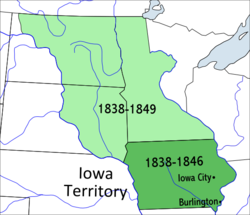Iowa Territory
| Territory of Iowa | |||||
| Organized incorporated territory of the United States | |||||
|
|||||
| The territory that did not become the state of Iowa in 1846 became unorganized territory. Government for this area would become organized as part of the Minnesota Territory in 1849. | |||||
| Capital |
Burlington (1838–1841) Iowa City (1841–1849) |
||||
| Government | Organized incorporated territory | ||||
| Governor | |||||
| • | 1838–1841 | Robert Lucas | |||
| • | 1841–1845 | John Chambers | |||
| • | 1845–1849 | James Clarke | |||
| History | |||||
| • | Organized from Wisconsin Territory | July 4, 1838 | |||
| • | Statehood of Iowa | December 28, 1846 | |||
The Territory of Iowa was an organized incorporated territory of the United States that existed from July 4, 1838, until December 28, 1846, when the southeastern portion of the territory was admitted to the Union as the State of Iowa. The remainder of the territory would have no organized territorial government until the Minnesota Territory was organized on March 3, 1849.
Most of the area comprising the territory was originally part of the Louisiana Purchase and was a part of the Missouri Territory. When Missouri became a state in 1821, this area (along with the Dakotas) effectively became unorganized territory. The area was closed to white settlers until the 1830s, after the Black Hawk War ended. It was attached to the Michigan Territory on June 28, 1834. At an extra session of the Sixth Legislative Assembly of Michigan held in September, 1834, the Iowa District was divided into two counties by running a line due west from the lower end of Rock Island in the Mississippi River. The territory north of this line (which started just south of the present-day Davenport) was named Dubuque County, and all south of it was Demoine County. When Michigan became a state in 1836 the area became the Iowa District of western Wisconsin Territory—the region west of the Mississippi River.
The original boundaries of the territory, as established in 1838, included Minnesota and parts of the Dakotas, covering about 194,000 square miles (500,000 km2) of land.
...
Wikipedia

